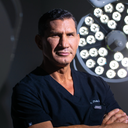Ugly side profile, how to improve? What procedures would balance my face? 23 years old and weigh 49kg. (Photos)
From the front, I'm ok with my face, but from the side, I hate it. What procedures would balance my face? I was thinking a chin implant; I have a slight malocclussion with overbite, but my dentist says it's too slight to consider surgery. With regards to Rhinoplasty, can my nose be made to slope downwards, like a right angle, as I seem to have a really low bridge and I fear getting the hump removed will flatten my profile even more? Thank you for any answers, any advice is highly valued!






